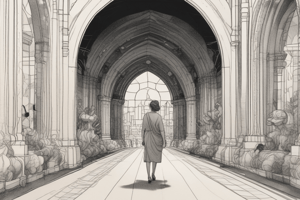Podcast
Questions and Answers
What is the effect of combining contrasting colors in a artwork?
What is the effect of combining contrasting colors in a artwork?
- To enhance the impact of anger or tension (correct)
- To evoke fear and intimidation
- To create a sense of tranquility
- To create a sense of movement and flow
What kind of lines can create a sense of instability and unease?
What kind of lines can create a sense of instability and unease?
- Horizontal lines
- Curved lines
- Diagonal lines (correct)
- Vertical lines
What is the effect of using soft, curved lines and harmonious shapes?
What is the effect of using soft, curved lines and harmonious shapes?
- To create a sense of movement and flow
- To evoke fear and intimidation
- To express anger and tension
- To convey a sense of tranquility and serenity (correct)
Why is practice and experimentation key to conveying emotions?
Why is practice and experimentation key to conveying emotions?
What is the purpose of balancing and harmonizing lines and shapes?
What is the purpose of balancing and harmonizing lines and shapes?
What is the effect of using darker, intense colors?
What is the effect of using darker, intense colors?
What is the primary focus of using lines and shapes in artwork?
What is the primary focus of using lines and shapes in artwork?
Why is it important to consider the weight and direction of lines?
Why is it important to consider the weight and direction of lines?
What type of lines are often associated with softness and tranquility?
What type of lines are often associated with softness and tranquility?
What is the effect of using curved lines in a composition?
What is the effect of using curved lines in a composition?
Which shape can evoke a sense of playfulness or comfort?
Which shape can evoke a sense of playfulness or comfort?
What type of lines and shapes can be used to create joyful or happy emotions in artwork?
What type of lines and shapes can be used to create joyful or happy emotions in artwork?
Why is it important to balance proportions and shapes?
Why is it important to balance proportions and shapes?
What is the result of combining different techniques and emotions?
What is the result of combining different techniques and emotions?
What type of colors can be used to convey a sense of sadness and melancholy?
What type of colors can be used to convey a sense of sadness and melancholy?
What type of lines and shapes can be used to convey anger and tension?
What type of lines and shapes can be used to convey anger and tension?
What type of composition can be used to enhance the overall positive vibe of an artwork?
What type of composition can be used to enhance the overall positive vibe of an artwork?
What type of colors can be used to convey anger and tension?
What type of colors can be used to convey anger and tension?
What is essential to pay attention to in a composition?
What is essential to pay attention to in a composition?
Why is contrast important in a composition?
Why is contrast important in a composition?
What is one way to master balancing and harmonizing lines and shapes?
What is one way to master balancing and harmonizing lines and shapes?
What can studying other artists' work help you with?
What can studying other artists' work help you with?
What do contour lines define in an object?
What do contour lines define in an object?
What is the purpose of hatching in art?
What is the purpose of hatching in art?
What do gesture lines capture in a subject?
What do gesture lines capture in a subject?
What do calligraphic lines replicate?
What do calligraphic lines replicate?
What are implied lines?
What are implied lines?
Why is balance important in a composition?
Why is balance important in a composition?
What can be used to create a sense of movement, energy, or chaos in a piece of artwork?
What can be used to create a sense of movement, energy, or chaos in a piece of artwork?
What type of line is often used to represent man-made objects or architectural elements?
What type of line is often used to represent man-made objects or architectural elements?
What is the main purpose of using overlapping shapes in artwork?
What is the main purpose of using overlapping shapes in artwork?
What technique involves using converging lines to guide the viewer's eye towards a vanishing point?
What technique involves using converging lines to guide the viewer's eye towards a vanishing point?
What is the term for the empty space around and between objects?
What is the term for the empty space around and between objects?
What can be used to create a sense of harmony and rhythm in a composition?
What can be used to create a sense of harmony and rhythm in a composition?
What is the term for distorting objects or figures to give the appearance of perspective?
What is the term for distorting objects or figures to give the appearance of perspective?
What can be used to direct the viewer's gaze and create a sense of flow within the composition?
What can be used to direct the viewer's gaze and create a sense of flow within the composition?
What can be used to add a sense of realism, dimension, and dynamism to artwork?
What can be used to add a sense of realism, dimension, and dynamism to artwork?
What is the main purpose of using geometric shapes in artwork?
What is the main purpose of using geometric shapes in artwork?
What is the primary purpose of incorporating negative space into a composition?
What is the primary purpose of incorporating negative space into a composition?
What is the benefit of observing and studying the works of other artists who excel in creating depth and movement?
What is the benefit of observing and studying the works of other artists who excel in creating depth and movement?
Why is it important to practice and experiment with different techniques and shapes?
Why is it important to practice and experiment with different techniques and shapes?
What is the result of creating a sense of balance and movement in an artwork?
What is the result of creating a sense of balance and movement in an artwork?
What is the key to developing a skill in creating depth and movement in artwork?
What is the key to developing a skill in creating depth and movement in artwork?
Flashcards are hidden until you start studying
Study Notes
Understanding Emotions through Lines and Shapes in Artistic Composition
- Emotions can be conveyed through lines and shapes in artwork, with different types evoking specific feelings
- Curved lines associated with softness and tranquility, while jagged lines convey tension or aggression
- Round shapes evoke playfulness or comfort, while angular shapes represent strength or unease
Conveying Emotions through Lines and Shapes
- Happy and joyful emotions can be conveyed through curved lines and organic shapes, with vibrant colors and open compositions
- Sadness and melancholy can be illustrated through vertical lines and drooping shapes, with cooler, desaturated colors and closed compositions
- Anger and tension can be effectively conveyed through sharp, jagged lines and angular shapes, with bold, intense colors
- Tranquility and serenity can be evoked through soft, curved lines and harmonious shapes, with muted colors and gentle variations
- Fear and intimidation can be conveyed through diagonal lines and sharp, angular shapes, with darker, intense colors
- Complex emotions can be conveyed by combining different techniques, incorporating contrasting lines and shapes or blending different emotions within the composition
Balancing and Harmonizing Lines and Shapes in Artistic Composition
- Understanding how to balance and harmonize lines and shapes is crucial for creating a visually appealing composition
- Consider the weight and direction of lines, using thick and bold lines to carry visual weight and diagonal lines to create movement and flow
- Balance proportions and shapes, aiming for a balance between large and small shapes, and experiment with different shapes to find the right combination
- Create contrast and unity with shapes, using different sizes, colors, and textures to create visual interest and harmony
- Experiment with different compositions, trying out different arrangements and taking risks to create a unique style
Line Techniques and Styles in Art
- Contour lines define the edges of an object, varying in thickness to create depth and dimension
- Hatching and cross-hatching create shading and emphasize form, with closely spaced or widely spaced lines achieving different effects
- Stippling creates patterns and textures using small dots, varying density and placement to create tonal values and depth
- Gesture lines are expressive and energetic, capturing movement and essence, while calligraphic lines are fluid and expressive, replicating brushstrokes
- Implied lines create movement and direction, while broken lines are discontinuous, used to create a sense of movement or chaos
- Organic lines are irregular and free-flowing, used to create a sense of movement, rhythm, and harmony, while geometric lines are straight, precise, and angular, used to create order, stability, and structure
Creating Depth and Movement Using Lines and Shapes
- Organic and geometric shapes can be used to create contrast and visual interest, with overlapping shapes establishing depth and space
- Linear perspective guides the viewer's eye towards a vanishing point, creating a sense of three-dimensional space
- Foreshortening distorts objects to create a sense of perspective, elongating certain shapes and compressing others to create a dynamic composition
- Techniques for creating movement include using curved, diagonal, or zigzag lines, with value and texture added to enhance the sense of depth and movement
- Utilizing negative space creates balance and movement, defining positive shapes and lines and adding depth and interest to the composition
Studying That Suits You
Use AI to generate personalized quizzes and flashcards to suit your learning preferences.




